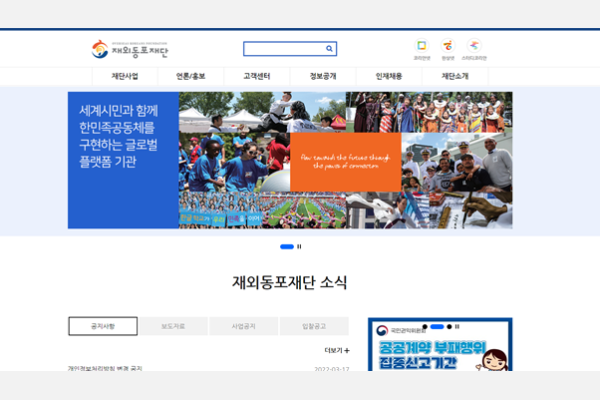Repository of Practices

To help and support overseas Koreans including Korean Adoptees
Dates
Type of practice
Summary
Overseas Koreans Foundation(OKF), a non-profit corporation under the Ministry of Foreign Affairs of Korea was established in 1997 to help and support overseas Koreans to maintain national ties while settling into their countries of residence as exemplary members of such societies. The Foundation provides educational programs, nurtures leadership for the next generation, empowers a sense of politics for overseas Koreans, promotes interaction with business leaders, exchanges culture, and conducts integrated network projects. The main contents are as follows:
- (Education project) Aids operating expenses for "Saturday Korean School" / Tailored-made support for Saturday Korean School/ Operates "Study Korean"/Provides educational materials / Intensive Korean language camp for future-generation Koreans.
- (Project for the future generation) Hold the future leaders' conference/ Supports overseas Koreans organizations for the future generation / Provides opportunities to study in Korea and scholarship programs to the overseas Korean elites
- (Exchange and support projects) stimulates activities of overseas Korean organizations / Assists the improvement of the rights and interests of Koreans abroad / Establish ties and a strong network between overseas Korean communities and Korea by hosting events such as World Korean Community Leaders Convention and commemorating World Korean Day
- (Cultures projects) Provides a venue for cultural and art activities for overseas Koreans and gives a foothold for establishing a Korean cultural community by stimulating cultural exchange between Koreans home and abroad / Provides overseas Korean cultural communities with traditional cultural items / Holds literature contest for overseas Koreans
- (Project for building an integrated network) Operates online networking platform between overseas Koreans and Korea / Manages an integrated network support system for overseas Koreans
- (Human rights projects for overseas Koreans) Support settlement and empowerment of descendants of overseas Korean adoptees and the underprivileged multicultural kids in residing countries
One of those various programs that OKF provides for overseas Koreans is “OKF Gathering for Overseas Korean Adoptees”. This program offers an opportunity for Korean adoptee participants to experience and better understand Korean culture so that they can feel more connected to Korean culture and their Korean roots. This program also aims to encourage the participants to form a social network among them through various sessions.
Organizations
Main Implementing Organization(s)
Detailed Information
Benefit and Impact
- With the cultural projects Korean and its overseas communities commune and feel sympathy based on the shared culture.
Key Lessons
Recommendations(if the practice is to be replicated)
Innovation
Additional Resources
Date submitted:
Disclaimer: The content of this practice reflects the views of the implementers and does not necessarily reflect the views of the United Nations, the United Nations Network on Migration, and its members.
More Related Practices:
- Resiliencia y Protección: Casa de Seguridad para Activistas Nicaragüenses en Honduras y Costa
- Migrant Domestic workers and research supporting campaign and litigation for inclusion in the Compensation for Occupational Injuries and Diseases Act
- Migration and Sustainable Development in The Gambia (MSDG)
- Engaging Migrants and Diaspora Communities for an Inclusive and Climate-Resilient Blue Economy in Kenya
- Engagement of migrants in migration management of Azerbaijan
Peer Reviewer Feedback:
*References to Kosovo shall be understood to be in the context of United Nations Security Council resolution 1244 (1999).
Newsletter
Subscribe to our newsletter.